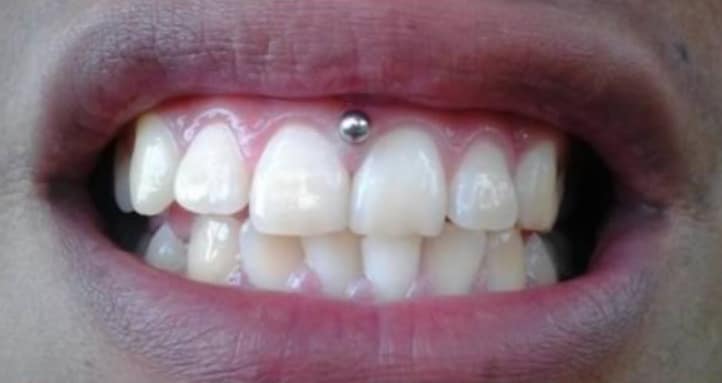Gum piercing might look trendy and cool, but it can have many not-so-cool consequences for your oral health. It can affect not only your gum tissue but also your teeth and jawbone underneath.
So, even though gum piercings might seem fun from afar, you should be aware of the potential risks and complications. Another thing you need to be careful about is the piercer.
There are certain things that you need to look out for in them and their parlour so that you can get this type of piercing safely. And, of course, you can’t slip up in the recovery either. So, to know exactly what you’re getting yourself into, make sure to read this to the end.
What Is A Gum Piercing?
Before you go ahead and decide to do anything, you should know what a “gum” piercing actually entails. Essentially, there are two types of gum piercings, which differ because of their location.
Maxillary Labial Frenulum (MLF) Piercing: MLF refers to the thin soft tissue that connects the upper lips to the gums. When that tissue is pierced, it’s called a gum piercing.

Gingival Piercing: Also known as trans gum piercing, this is truly the piercing of the gum by plastic or metal jewellery. Only this is even riskier, especially if the piercer isn’t aware of the dental anatomy.

In general, a gum piercing is also known as a smiley piercing because, of course, you can see the piercing when you smile. Funnily enough, when the same piercing goes into the frenulum at the bottom of the mouth, it’s called a “frowny piercing.”
In any case, the American Dental Association (ADA) has advised against both intraoral (completely inside the mouth) and perioral (partially outside the mouth, as on lips) piercings.
According to them, the cons just don’t outweigh the pros with these. So, they’re definitely not worth it. And they’re not wrong.
What Are The Risks & Complications Of Gum Piercings?
There is a variety of ways in which gum piercings can jeopardise your oral health. These are as follows:
Gum Recession
Gum piercings can increase the risk of gum recession. The constant rubbing of the piercing against the gum tissue can damage it, which can make it pull away from the teeth.
Moreover, piercing can result in the accumulation of plaque on that. Since the piercing would block access to the teeth behind it, any food particle can remain stuck there. And if this plaque is not removed, it can cause gum disease. This can also cause gum recession, among other problems.
Tooth Damage
The teeth around the piercing can easily chip or crack. Of course, this is more common with metal piercings over plastic ones, it’s still a problem with both of them.
As the piercings rub off at the surface of the teeth, they can also cause wear and tear to the enamel. And with that, your teeth will become more vulnerable to cavities and decay. Together with gum disease, you might end up losing your tooth entirely.
In this case, you’ll end up needing restorative treatments like crowns, composite bonding, veneers, or implants. But keep in mind that piercing can even damage artificial teeth.
Blood-Borne Diseases
Piercings have the potential to transmit blood-borne diseases like:
- HIV
- Hepatitis
- Herpes simplex
- Syphilis
- Tuberculosis
- Epstein-Barr virus
- Tetanus
For this, and many other reasons, the choice of the piercer is extremely important. The instruments, needles and jewellery used should all be completely sterilised.
Infections
Gum piercings also put you at risk of infection. There are billions of bacteria inside the mouth, and when the tissue inside the mouth is pierced, your risk of developing an infection is high.
Here, you should also know that oral bacteria can enter the bloodstream and cause even more dangerous health problems. For instance, it can cause Ludwig’s angina (a skin infection which can be life-threatening) or endocarditis (inflammation of the heart valves’ lining).
Therefore, if you have a pre-existing health condition, make sure to consult your doctor before getting a piercing.
Choking
Gum piercing poses the risk of choking. If it’s loose and comes off or breaks, you can choke on it while eating, sleeping or simply inhaling air.
This can also result in an injury and can even be life-threatening. Therefore, make sure to take this into consideration when deciding to get an oral piercing.
Allergic Reaction
According to the American Academy of Allergy, Asthma & Immunology, nickel is the leading cause of contact dermatitis. And piercings are made of this particular metal (although not all of them).
And according to Mayo Clinic, an allergic reaction to nickel can start hours to days after the exposure to the metal. So, you need to be careful about this as well.
Allergic reactions can also be triggered by stainless steel, titanium, or gold (other metals of which piercings are made).
Rejection
Your body may perceive the piercing as a foreign object and reject it altogether.
And your body will try to get rid of the piercing itself by pushing it to the surface of the skin. This will cause a migration of the piercing from its original position, which can become problematic.
Others
There are some other problems associated with gum piercings, which include:
- Nerve damage
- Bone loss
- Difficulty eating and speaking normally
- Oral lesions and ulcers
- Increased saliva production
- Traumatic tear
- Scarring
There may also be the possibility of a diastema (which has been reported in tongue piercings), where you form gaps between teeth.
How To Care For Your Gum Piercing?
Gum piercings can take 1-3 months to heal, and you might experience the following side effects during the recovery:
- Swelling
- Pain
- Bleeding
- Soreness
If, however, you notice any signs of infection, such as bad breath, fluid discharge, worsening bleeding and swelling, etc., make sure to contact a doctor immediately.
Other than that, for aftercare, you’ll probably have to avoid smoking while you’re healing. You may also be asked to refrain from drinking alcohol or eating hard, spicy and acidic foods.
And as much as you may want to, don’t touch, poke or play around with the piercing. Your fingers can transfer more germs to your mouth. Beware of saliva exchange as well.
Of course, to take care of your teeth, you need to brush twice a day and floss. You might also be recommended the use of an alcohol-free mouthwash to keep the mouth clean.
Before engaging in any activity that may injure you, you should remove your piercing even after your tissue has healed. For instance, when playing contact sports.
And lastly, make sure to have a post-piercing dentist checkup, along with regular checkups.
What To Look For In A Piercer?
Before going to a piercing parlour, make sure to check out its online reviews. And it’s always a good idea to ask if they have any training and certification. You also shouldn’t hesitate to ask about the number of years for which they’ve been doing piercings.
And when you’re at the shop, make sure to check the hygiene and sterilisation measures that are being taken. According to the Better Health Channel, ideally, there should be:
- Ample lighting and ventilation (which can prevent the build-up of germs)
- A dedicated area for ensuring the cleanliness, “disinfection and sterilisation of instruments.”
- Interior and furniture that can be easily cleaned and things that need to be touched should be covered with single-use plastic bags.
- A hand wash sink
If at any point, you don’t get a good feeling from the person or you notice any red flags (they’re not answering your questions, don’t seem in good health, or pressurising you), you should consider going to another shop.
Conclusion
A gum piercing isn’t something that you should take lightly. The ADA has advised against it since it carries many risks. You need to be especially careful if you’re already suffering from a health problem.
Moreover, before you get a piercing, make sure to do your research in finding the right piercer. Those who don’t know what they’re doing can end up causing irreversible damage. So, be careful.
And if you’re experiencing any oral health problems after getting a piercing, make sure to get in touch with a board-certified dentist.
FAQ
What happens if you pierce swollen gums?
Swollen gums can be indicative of an underlying problem. For this reason, you should first get yourself checked and then consider getting a piercing.
When can you not get a gum piercing?
If your frenulum is too small, you have braces (since the piercing can get stuck in them), or you have gum disease, you may not be a suitable candidate for gum piercing. You can further consult your piercing provider about it.
Could gum piercing affect dental X-rays?
By absorbing X-rays, metal can hide the underlying tissue, so it can affect the X-ray. Certain modified plastics can affect it as well, so it’s just better to remove them.
Reviewed and approved by Dr Izbel Aksit.